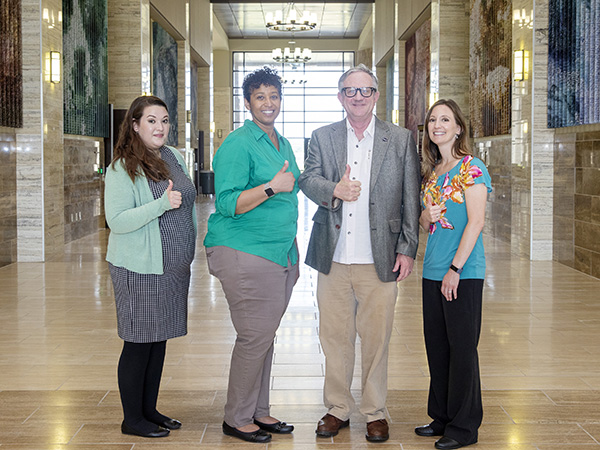CVM Experts To Train M.D. Anderson Histotechnology Students Through New Internship Program
Next summer, students participating in the histotechnology program at The University of Texas M.D. Anderson Cancer Center’s School of Health Professions will have the opportunity to spend 12 weeks at the Texas A&M College of Veterinary Medicine & Biomedical Sciences (CVM) gaining hands-on experience and learning from experts in the CVM’s Histology Service Laboratory.

As part of a five-year agreement, one student will have the option to travel to College Station for an internship during their final semester of the histotechnology program. M.D. Anderson previously has partnered with other organizations that allow their students to have diverse experiences in real-world laboratory settings.
“We’re thrilled to partner with M.D. Anderson’s histotechnology program and provide an opportunity for students to intern at our veterinary histology service lab,” said Dr. Dana Kneese, a clinical assistant professor in the CVM’s Department of Veterinary Integrative Biosciences (VIBS). “Histotechnology spans human and veterinary medicine, so we’re coming together to provide a ‘one health’ approach to the field.”
One of the missions of the CVM’s Histology Service Lab is to create a teaching environment, and this partnership would offer a great experience for not only the students at M.D. Anderson but also for us at Texas A&M in fulfilling that mission, according to Kneese.
“Histologic technologists are highly sought-after in both veterinary and human medicine,” she said. “They are an integral part of the medical field because they are highly skilled in preparing tissue samples and histology slides for research and diagnostic purposes. We are excited to be affiliated with the histotechnology program and help train the next generation of histotechnologists.”
Histotechnology centers on the detection of tissue abnormalities and the treatment for the diseases causing the abnormalities, according to the National Society of Histotechnology.
At the CVM, M.D. Anderson’s histotechnology students in their clinical phase will be able to practice the skills they’ve begun acquiring in M.D. Anderson’s one- or two-year tracks, including the processing and staining of histology slides that can be examined by a pathologist or researcher.
The CVM’s Histology Service Lab offers students a unique experience in that they will be working under the guidance of a certified histotechnician to process diagnostic samples that come through the Veterinary Medical Teaching Hospital (VMTH) along with research samples from many other departments and colleges.
“In the Histology Service Lab, M.D. Anderson students will gain clinical instruction in histotechnology to help prepare them to enter the workforce as highly skilled histotechs,” Kneese said. “Student interns will learn how to handle many different types of tissue, ranging from horns and hooves to small, delicate tissues from animals of all sizes for both diagnostic and research purposes.”
Histotechnology is a field that requires a lot of skill, as creating slides for diagnostics and research is an intricate process, according to Kneese.
“Histotechs are experts at determining how to prepare all types of tissues so that pathologists and researchers can microscopically evaluate high quality tissue sections to make a diagnosis or collect research data,” she said. “What they do is really important—veterinarians, human doctors, and researchers all utilize a histology service lab.
“If a veterinarian removes a mass and sends it off for a pathologist to determine if it’s cancer and what kind of cancer it is, they’re utilizing a histology lab,” she said.
The partnership came about when associate professor Mark Bailey, histotechnology program director, and Dr. Toysha Mayer, associate program director, contacted Kneese to establish an Education Agreement Affiliation.
“We are honored to have established this affiliation with the Texas A&M College of Veterinary Medicine & Biomedical Sciences,” Bailey said. “The University of Texas M.D. Anderson Cancer Center School of Health Professions and program in histotechnology consider the Texas A&M Departments of Veterinary Integrative Biosciences and Veterinary Pathobiology to be a stellar facility staffed with the topmost veterinary medicine faculty and professionals who will be able to provide our students with a comprehensive histotechnology experience as related to veterinary pathology.
“Histotechnologists are in high demand throughout the greater Texas area and the United States, and our students’ career options include working in clinical diagnostic labs, research labs, forensic labs and veterinary pathology labs,” he said. “We were delighted when Dr. Dana Kneese responded to our request to establish an affiliation with her department. The distinctive collaboration between our prestigious institutions of higher education will enrich our students’ histotechnology competencies.”
Kneese was also asked to serve on the M.D. Anderson Histotechnology Program Advisory Committee, for which she joins other representatives from affiliated institutions to discuss the program and provide recommendations to ensure student’s success in the program and thereafter.
###
For more information about the Texas A&M College of Veterinary Medicine & Biomedical Sciences, please visit our website at vetmed.tamu.edu or join us on Facebook, Instagram, and Twitter.
Contact Information: Jennifer Gauntt, Interim Director of CVM Communications, Texas A&M College of Veterinary Medicine & Biomedical Science; jgauntt@cvm.tamu.edu; 979-862-4216


